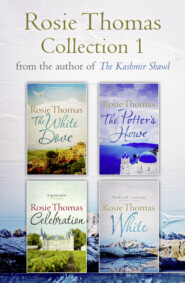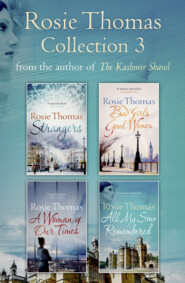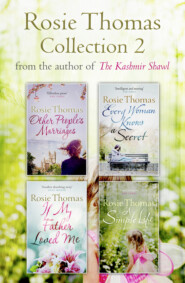По всем вопросам обращайтесь на: info@litportal.ru
(©) 2003-2024.
✖
Bad Girls Good Women
Автор
Год написания книги
2018
Настройки чтения
Размер шрифта
Высота строк
Поля
Mattie watched him, too. She was intrigued by his theatrical standards, and by the way he cajoled or insulted his lack-lustre company into meeting them. He must have been a good director, once, she thought. He was also realistic. He couldn’t give much stature to Raina and her Bluntschli, played by a hollow-chested, languidly poetic young actor called Hugh, so he made them tender instead. And he sent the hackneyed drawing-room comedy humming along at a snappy pace that disguised its predictability. The audiences always enjoyed it much more than the Shaw classic. John didn’t ask too much of his actors, but he expected a certain amount and he made certain that they delivered it. Most of the company hated him, but they were careful enough to be civil to his face. Vera lived in terror of him. Mattie didn’t know what she thought. There was still the potent appeal of his voice. Sometimes when she heard it she would turn around and look covertly at him.
Mattie had suffered from his temper more than any of the others at the beginning. On her third night she had failed to deliver a tray of glasses to the wings for the maid to walk on with. The actors on stage had been forced to drink the engaged couple’s health in thin air, and John Douglas had rounded on Mattie in the interval as if he wanted to tear her arms off.
‘I won’t tolerate incompetence,’ the voice boomed at her. ‘You can’t help your ignorance or your crassness, and the rest of us must put up with you. But you do have a marked script in your hands and it tells you in plain English what to do, and when.
None of it is very difficult, even for you. Don’t make another fucking mess-up like that.’
‘I won’t,’ Mattie made the mistake of saying.
The voice attacked her all over again. ‘Don’t assure me of that as though you’re giving me a fucking present. Just remember what I say.’
How could I forget? Mattie retorted silently as she backed away. It was after that that she learned to listen and say nothing, like Sheila Firth did. Wisely she didn’t copy Sheila’s pained, innocent, I-will-forgive-you expression. She was only the stage manager, not Leading F.
Gradually, as she grew more confident and more capable, John Douglas turned his attention elsewhere.
One Friday evening John and Vera were sitting in the office before the six o’clock Treasury call. In very poor weeks the box-office receipts didn’t even cover the company’s wages, and those were the times when John had to telephone Francis Willoughby. This time, however, the takings were good and John and Vera were working on the wage packets. It was a complicated process because some actors received a percentage of the take above a certain figure, so their cuts had to be calculated and deducted from the total before the profits could be grudgingly sent off to Francis. It was Mattie’s job to keep Vera supplied with tea and John with whisky while they worked.
She was filling the kettle in the grubby kitchen cubby-hole when Sheila Firth brushed past. Sheila was wearing her street clothes, complete with a soft black felt hat pulled down over her eyes. That was unusual, because Sheila liked to be in her dressing room in good time so that she could drift soulfully around in her robe, dabbing at her wig and make-up. Mattie heard her stop at the office door. Sheila opened it, and when John and Vera looked up she half-fell against the frame.
‘I can’t go on tonight,’ she said. Her voice quivered with emotion.
Vera got up from her seat and scuttled away like a rabbit, ducking around the tragic Sheila. She left the door considerably open, so that Mattie could hear everything.
‘Why not?’ John’s voice was expressionless by comparison. There was a long, palpitating pause, and then Sheila said, ‘You don’t really understand about love, John, do you?’ Hugging herself with pleasure, Mattie crept closer.
Sheila’s story came spilling out without any further prompting. Everyone knew that she was in love with the leading man of another of Francis’s companies. It was a love conducted on a higher plane, a rarefied and special thing. Sheila was fond of elaborating on the themes of it. Now, Mattie gathered from between the racking sobs, her leading man had abandoned Sheila for a thirty-five-year-old character actress.
‘I worked with her in Peter Pan,’ Sheila wailed. ‘She’s a woman completely without talent or refinement.’
Mattie stifled her laughter. She was thinking. Sheila was understudied by a mousy girl who took the part of the maid and two other walk-ons. The mouse had a heavy cold. She was practically voiceless, and her nose was swollen and bright scarlet.
‘I’m so very, very hurt, John. So crushed, and broken. I can’t work when I feel like this. I can’t …’ The sobs broke out again.
Mattie waited gleefully for John’s outburst. But if she had been thinking, he had been thinking quicker. She heard his chair creak, then the thump of his stick as he took two steps.
‘My poor girl,’ the rich voice murmured. ‘You poor, brave girl. And now you must learn about pain.’
Mattie was transfixed. She slipped closer, to the spot where she could peer through the crack in the door and watch.
John was towering over Sheila. He had taken her face between his hands and he was looking deep into her eyes.
‘You will suffer, my dear. But you can, and you must, cling to your art. Only by making that sacrifice can you grow, and it will reward you by growing with you.’
Sheila let out a low moan and her head fell forwards against John’s shoulder.
Mattie gaped. You clever old bugger, she thought. Admiration flooded through her, and swept away her short-lived dream of stepping on to the stage in Raina’s opening-scene nightgown and fur wraps.
She slipped back to the cubby-hole and clattered noisily with the kettle and cups. When the tea was ready she laid a tray and carried it back to the office. Sheila was nodding bravely, with her hands folded between John’s.
Mattie knelt beside her and poured her a cup of tea. When Sheila took the cup Mattie put her arm around her shoulder and gave her a hug of sisterly solidarity.
‘Oh, Mattie,’ Sheila broke out again. ‘It takes a terrible shock like this to make one realise how valuable friends are.’
‘I know, I know,’ Mattie saw warmly. ‘The door was open, and I couldn’t help hearing a little. Just remember that we all love you, and admire you.’ Not wanting to risk overdoing it, she tiptoed away again.
Ten minutes later, her face set in lines of sorrowful courage, Sheila was on her way to her dressing room.
Mattie went back for the tray. John was sprawled in his chair with his hands over his face, but he looked up when he heard her come in, and smiled at her.
‘Good,’ he said. ‘Thank you.’
It was so rare for him to praise, and it was such an odd, conspiratorial moment, that Mattie didn’t know what to say.
‘I need a drink,’ John grumbled. He poured whisky into two glasses and handed one to Mattie. ‘Will you join me? To celebrate our success in going forward into another evening of theatrical mediocrity?’
They raised their glasses and drank.
With the spirits burning the back of her throat, Mattie blurted out, ‘What are you doing here?’
He turned his molten glare on her. His eyes were the colour of syrup, and because of their surprising glow they were the only part of him that looked healthy. His skin was grey, and the front of his ash-coloured hair was yellow with nicotine. Mattie noticed that his hands on the arms of his chair were knotty with pain. She might have felt sorry for him, if she hadn’t felt more afraid.
‘Doing?’ He laughed throatily and she relaxed a little. ‘Isn’t that obvious? Earning a few quid. A very few, I should say, thanks to your friend Francis. One has to live, and I do have a wife to support.’
‘You’re married?’
The laugh again. ‘Of course I’m married. I’m fifty-four years old, and one would have to be very clever, or very determined to escape the net, to survive as a bachelor for this long.’
Mattie thought back over the grinding weeks that had just passed. Her own time was fully occupied, but John Douglas was hardly less busy. How did he fit in a wife, unless he glimpsed her on Sundays when he drove off in his Standard Vanguard?
‘Where does she live?’
‘You’re an inquisitive little girl, aren’t you? Helen lives in our house, an attractive if chilly Cotswold stone edifice outside Burford, in Oxfordshire. To forestall your next question, she loathes and despises everything to do with the theatre, and prefers to live her own life while I pursue my spectacular career. It is a perfectly agreeable and amicable arrangement, and I return to Burford and to my wife whenever I can.’
If Mattie had had time to analyse it, she would have realised that the vaguely unhappy feeling that took hold of her now was disappointment. But John turned sharply to her.
‘And what are you doing here?’
‘I want to be an actress.’
She said it automatically, and she regretted it at once. His shout of laughter was hurtful, but it made her angry too. John Douglas saw both reactions.
‘Of course you do. Of course you do. Do you have any experience?’
‘Only amateur. But I’m good.’ She was stiff and red-faced now, like an offended child.
He nodded. ‘Tell me, did you think your big chance was coming tonight? With Sheila’s broken heart and whats-her-name’s laryngitis? I bet you know all the lines.’
Mattie shrugged. She felt too angry to give him the satisfaction of an answer. He waited for a moment, and then he drawled, ‘Well, then. Thank you.’











